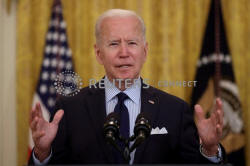|
President Joe Biden's administration has been reviewing a number
of aspects of U.S.-China policy, including a ban imposed under
his predecessor Donald Trump on investments in certain Chinese
companies that the United States says are linked to China's
armed forces and intelligence agencies.
Investors now have until 9:30 a.m. (1330 GMT) on June 11 to
compete their transactions, the U.S. Treasury Department said in
a notice posted on its website. The previous deadline was May
27.
A senior administration official said the White House was deeply
concerned about the issue, and that the two-week extension would
allow it to address problems in the Trump administration's
executive order, which was drafted and implemented in a
"careless manner."
The new policies, once complete, would "strengthen our ability
to prohibit U.S. investment in the PRC's military, intelligence,
and other security apparatuses," the official said, using an
acronym for the People's Republic of China.
"We will have more on the permanent way forward soon, and we are
determined to deal with this issue expeditiously," the official
said.
A request for comment from the Chinese consulate was not
immediately returned.
At least eight Chinese companies have been placed under such
restrictions. One, mobile phone maker Xiaomi , filed a lawsuit
in response, and the U.S. Defense Department agreed to remove it
from the banned list.
In March, a federal judge had temporarily blocked enforcement of
the Xiaomi blacklisting, citing the U.S. government's "deeply
flawed" process for including it in the ban. The judge later
also suspended an investment ban imposed on Luokung Technology
Corp , a Chinese mapping technology company.
Xiaomi was among the more high-profile Chinese technology
companies that Trump targeted for alleged ties to China's
military.
Smartphone rival and telecommunications equipment maker Huawei
Technologies Co Ltd [HWT.UL] was also put on an export blacklist
in 2019 and barred from accessing critical technology of U.S.
origin, affecting its ability to design its own chips and source
components from outside vendors.
The measures effectively crippled the company's smartphone
division.
The U.S. Department of Defense also placed similar restrictions
on China's Semiconductor Manufacturing International
Corporation, a firm key to China's national drive to boost its
domestic chip sector.
(Reporting by Michael Martina, Susan Heavey and Trevor Hunnicutt
in WashingtonEditing by Peter Graff and Aurora Ellis)
[© 2021 Thomson Reuters. All rights
reserved.] Copyright 2021 Reuters. All rights reserved. This material may not be published,
broadcast, rewritten or redistributed.
Thompson Reuters is solely responsible for this content.

|
|





